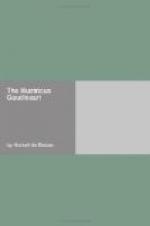CHAPTER I
The commercial traveller, a personage unknown to antiquity, is one of the striking figures created by the manners and customs of our present epoch. May he not, in some conceivable order of things, be destined to mark for coming philosophers the great transition which welds a period of material enterprise to the period of intellectual strength? Our century will bind the realm of isolated power, abounding as it does in creative genius, to the realm of universal but levelling might; equalizing all products, spreading them broadcast among the masses, and being itself controlled by the principle of unity,—the final expression of all societies. Do we not find the dead level of barbarism succeeding the saturnalia of popular thought and the last struggles of those civilizations which accumulated the treasures of the world in one direction?
The commercial traveller! Is he not to the realm of ideas what our stage-coaches are to men and things? He is their vehicle; he sets them going, carries them along, rubs them up with one another. He takes from the luminous centre a handful of light, and scatters it broadcast among the drowsy populations of the duller regions. This human pyrotechnic is a scholar without learning, a juggler hoaxed by himself, an unbelieving priest of mysteries and dogmas, which he expounds all the better for his want of faith. Curious being! He has seen everything, known everything, and is up in all the ways of the world. Soaked in the vices of Paris, he affects to be the fellow-well-met of the provinces. He is the link which connects the village with the capital; though essentially he is neither Parisian nor provincial,—he is a traveller. He sees nothing to the core: men and places he knows by their names; as for things, he looks merely at their surface, and he has his own little tape-line with which to measure them. His glance shoots over all things and penetrates none. He occupies himself with a great deal, yet nothing occupies him.
Jester and jolly fellow, he keeps on good terms with all political opinions, and is patriotic to the bottom of his soul. A capital mimic, he knows how to put on, turn and turn about, the smiles of persuasion, satisfaction, and good-nature, or drop them for the normal expression of his natural man. He is compelled to be an observer of a certain sort in the interests of his trade. He must probe men with a glance and guess their habits, wants, and above all their solvency. To economize time he must come to quick decisions as to his chances of success,—a practice that makes him more or less a man of judgment; on the strength of which he sets up as a judge of theatres, and discourses about those of Paris and the provinces.




